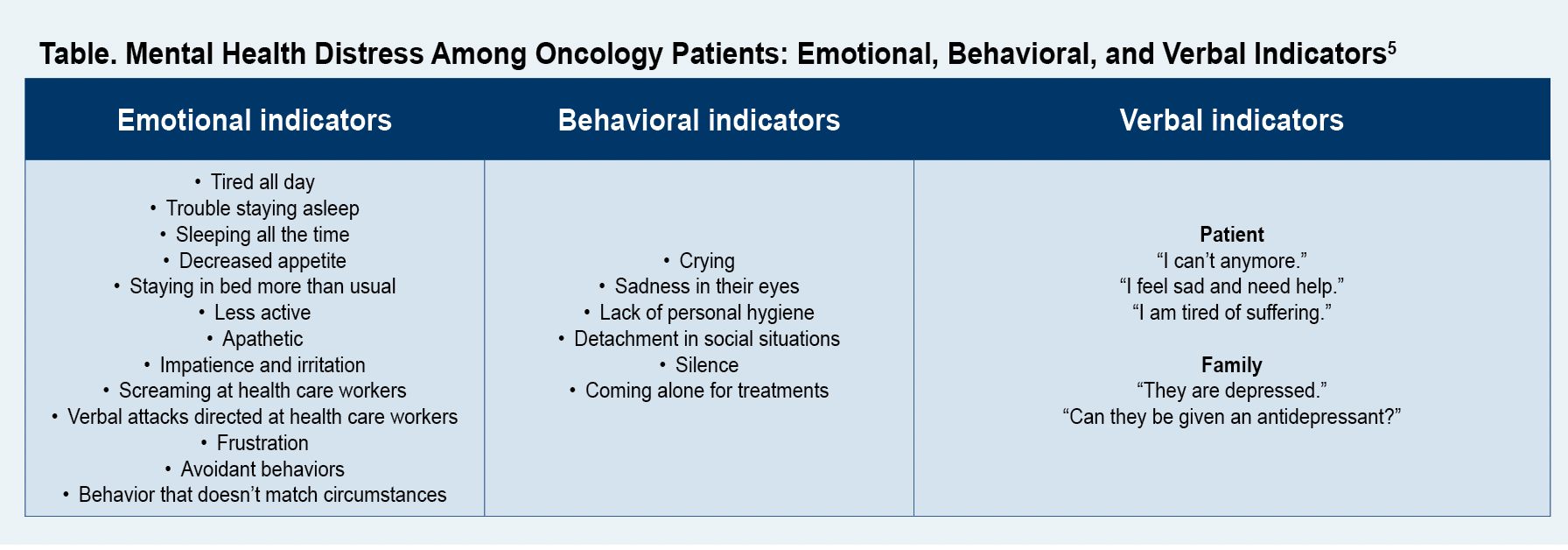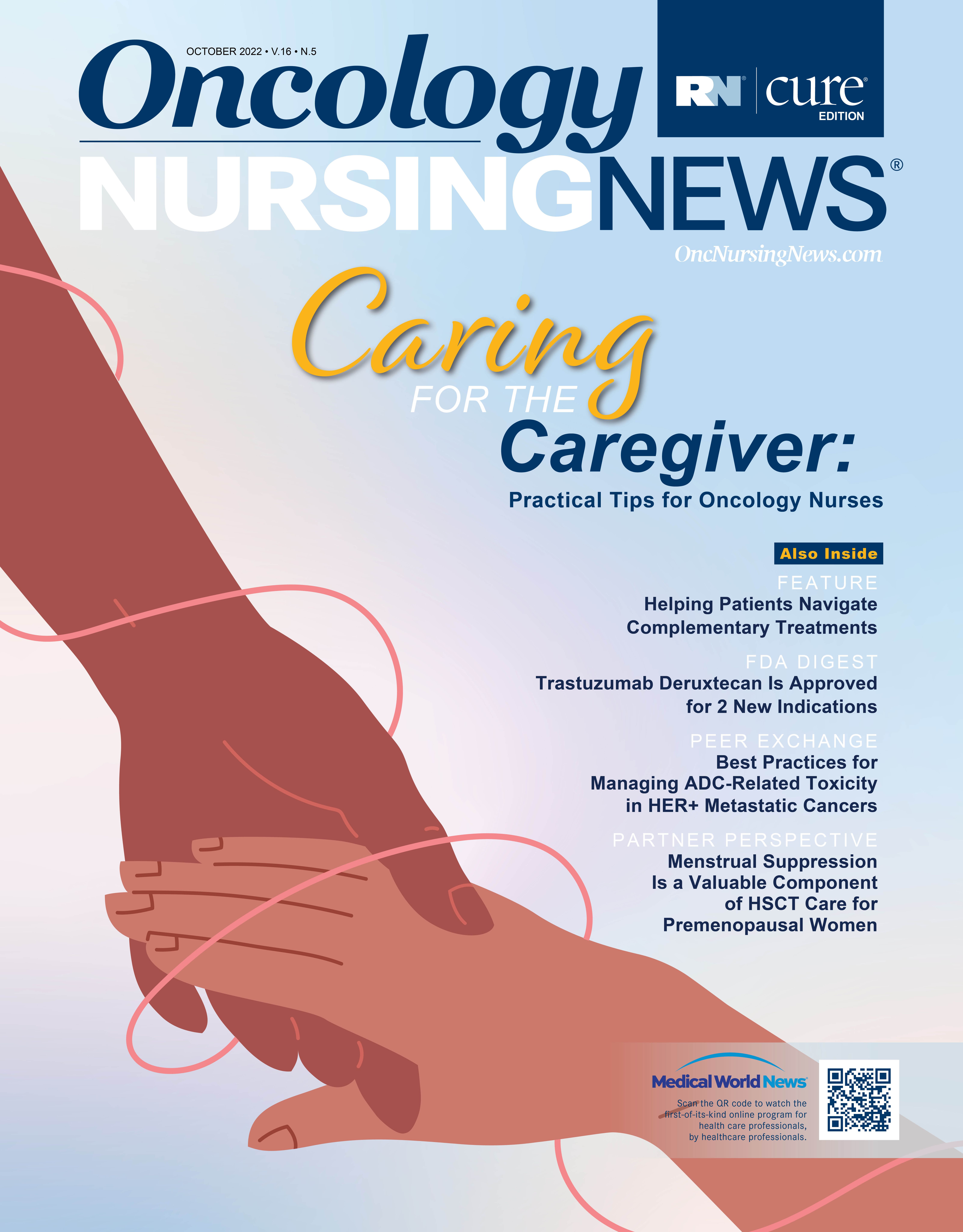Oncology Nurses Need Better Resources to Help Patients With Mental Health Problems
Although oncology nurses are trained to show empathy and offer support, they lack the resources to adequately care for patients with acute mental health problems.
Stephanie Jackson, DNP, MSN, RN, AOCNS, BMTCN

I recently cared for a 32-year-old woman who was admitted to the Inpatient Oncology Unit 2 months after giving birth to her first child. She had been transferred to us for a higher level of care and was diagnosed with acute leukemia. The joy of having a baby quickly turned to insomnia, and she began having panic attacks about her disease as well as treatment-related nausea.
She also had a history of depression and suicidal behavior, which posed a significant challenge for her care team. Our attempts to manage the mental problems that were beginning to become manifest during her third week were unsuccessful. Eventually, the nursing staff started to feel that they had “failed” to “help her feel better” and no longer wanted to have her as a patient.
No patient assignment was conducive to caring for her and helping her cope. After many failed attempts, the woman requested alternative therapy for anxiety and insomnia and to cope with not being able to see her baby and was eventually prescribed medicinal cannabis.
The Problem
Unfortunately, 30% of patients with cancer develop a mental disorder during the course of their illness.1 Those currently recognized in the literature include anxiety and mood disorders, which can have a negative impact on treatment, lead to suicidal ideation, and create additional difficulties for health care workers. Initially, the hospital stay can be prolonged.2 But as time passes, patients may become dissatisfied and not adhere to treatment.3 Diminished overall quality of life can lead to increased mortality.4
Oncology nurses have also identified suicidal ideation as challenging to manage. Currently, there are no protocols they can follow in terms of who should be contacted, who should complete the documentation, and who should assess patients.5 Although nurses are trained to assess the psychosocial needs of patients, they need better resources to mitigate patient mental health problems.
The Obstacles
Oncology nurses face a number of obstacles when addressing a patient’s mental health, including lack of training, increased workload, and lack of resources or access to resources.5 In addition, the stigma surrounding mental disorders continues to plague health care and to make patients hesitant to seek treatment.
Increased workloads significantly hinder a nurse’s ability to manage mental health disorders.5 The complexity of the care inpatients require doesn’t lend itself to prompt treatment escalation. Even when patients are coping badly, nurses may prioritize the care that is most urgently needed.
Moreover, the number of psychologists, psychiatrists, and social workers in hospitals is extremely limited. During the pandemic, many were working from home and triaged emergency cases to maximize safety.

The Solution
Standardized mental health assessment tools are essential for nurses to recognize the problem early, and clear guidelines are needed to respond to a mental crisis once identified.5 Low-intensity cognitive therapy can be extremely effective, but nurses need to be taught how to deliver it.
Oncology nurses can also help reduce the stigma attached to mental health care, which not only prevents timely treatment but leads to seclusion.6 Nurses can work to increase awareness about how this stigma reduces quality of life.
Nurses are gatekeepers who can identify disorders early and triage patients. Although oncology nurses in particular are trained to show empathy and offer support, it is clear from the literature that they lack the competence to care for patients with acute mental health problems. It is equally clear that patients with such problems must be promptly identified and assessed by nurses who are trained and possess the correct guidelines.
References
- Nakash O, Liphshitz I, Keinan-Boker L, Levav I. The effect of cancer on suicide among elderly Holocaust survivors. Suicide Life Threat Behav. 2013;43(3):290-295. doi:10.1111/sltb.12015
- Prieto JM, Blanch J, Atala J, et al. Psychiatric morbidity and impact on hospital length of stay among hematologic cancer patients receiving stem-cell transplantation. J Clin Oncol. 2002;20(7):1907-1917. doi:10.1200/JCO.2002.07.101
- Bui QUT, Ostir GV, Kuo YF, Freeman J, Goodwin JS. Relationship of depression to patient satisfaction: findings from the barriers to breast cancer study. Breast Cancer Res Treat. 2005;89(1):23-28.doi:10.1007/s10549-004-1005-9
- Adler NE, Page AEK, Institute of Medicine (US) Committee on Psychosocial Services to Cancer Patients/Families in a Community Setting, eds. Cancer Care for the Whole Patient: Meeting Psychosocial Health Needs. National Academies Press (US); 2008. https://pubmed.ncbi.nlm.nih.gov/20669419/
- Granek L, Nakash O, Ariad S, Shapira S, Ben-David M. Mental health distress: oncology nurses’ strategies and barriers in identifying distress in patients with cancer. Clin J Oncol Nurs. 2019;23(1):43-51. doi:10.1188/19.CJON.43-51
- Corrigan PW, Druss BG, Perlick DA. The impact of mental illness stigma on seeking and participating in mental health care. Psychol Sci Public Interest. 2014;15(2):37-70. doi:10.1177/1529100614531398




